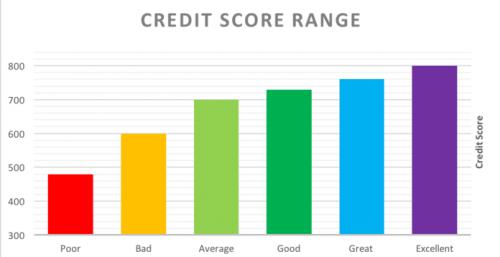All you need to know about Credit Score Ranges

Credit score is considered as the most important point of eligibility lenders require from borrowers on loans and similar other credit-based tools and instruments. It is a numerical representation of an individual’s creditworthiness and financial responsibility.
A score around or above 750 is considered as a good credit score and to avail the most beneficial financial products and services. There are things you can do to improve your credit score in case it is around the mentioned mark.
What is a good credit score?
Credit scores are three digit numbers to grade an individual borrower based on their past records of transactions. The credit rating number is allotted to an individual by a credit bureau, preferably CIBIL that holds the relevant details of the borrower.
The scores are primarily divided into three categories, namely bad, fair and good credit score. The details are –
· A bad score ranges between 300 and 629.
· A fair rating ranges between 630 and 689.
· A good credit score is in the range of 690 to 719.
However, an exceptionally good credit score is any score beyond 720. These ratings are directly associated with risks; a lower score will indicate a higher risk and vice-versa. An exceptionally good score indicates that you are good with repayments in case you have availed a personal loan or any other loan or even a credit card.
Factors which decide credit score
Credit score is borrower-specific in nature and it is influenced by many factors. The factors are mentioned below –
· History of payment
A history of delayed or missed payments will lessen your credit score. In order to have a decent credit rating, you need to have a clean on-time payment history. Make sure you repay your loan EMIs or credit card outstanding before the due date. Proper financial planning is vital to stay ahead of such scenarios.
· Utilization of credit
Your credit score is also determined by your credit utilization ratio. A credit card user who sticks to under 50% credit utilization ratio is deemed as unstable and balanced for a good score. Besides, keep a check if your CIBIL score is getting you down. In this regard, it is important to keep a track of your expenses so that you do not end up spending more.
· Credit account vintage
Your credit rating is based solely on your financial history which includes numerous pointers of your financial behavior while utilizing credit-based financial products and services. So, the longer you have used such products, i.e. a credit card or a loan, the higher will be your credit rating or CIBIL score.
Hence, to have a good credit rating, it is important that you keep a clean payment history with minimum delayed and missed payments. Clearing your debt is the key to improve your CIBIL score.
How does a good credit score affect you?
As your credit score improves, you are considered as a more responsible and creditworthy individual and enjoy benefits such as –
u You can avail the most feature-rich financial products.
u You can negotiate for lower interest rates on loans as a creditworthy borrower.
u Loan approvals becomes easier and faster with a good credit score.
For instance, Bajaj Finserv offers Personal Loans with approval within 24 hours to lenders who have an above par credit score. They provide pre-approved offers on such loans, as well as numerous financial products such as home loans, home loans, etc. You can check your pre-approved offer by providing a couple of details that contain your name and contact number.
Hence, a good credit score will give you access to several financing avenues from where you can get credit. Besides, it will also ease your application approval. If you are consistently maintaining your repayment schedules, then you can easily predict whether your application will get approved or if you will have a lower interest rate.
Comments